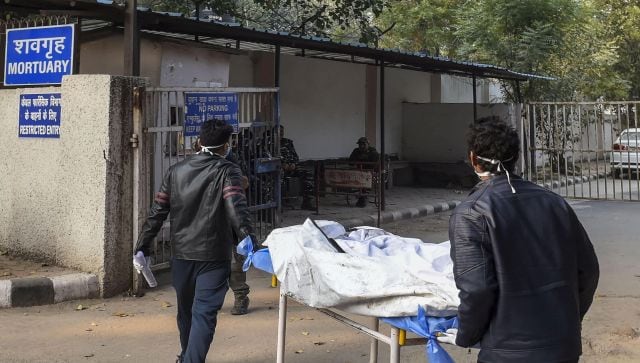Having sex with dead people not punishable in India: Why do people commit necrophilia, which countries criminalise it?
Having sex with dead people not punishable in India: Why do people commit necrophilia, which countries criminalise it?

It might come as a shocker but necrophilia is not considered rape in India. The law says so. The Karnataka High Court on Tuesday ruled that the sexual assault of a body did not come under the ambit of rape or unnatural offences under the Indian Penal Code.
The court passed the order while acquitting a man from charges of raping a 25-year-old woman after murdering her. It said that “unfortunately in India no specific legislation is enacted, including under the provisions of IPC for the purpose of upholding dignity and protecting rights and crime against the dead body of the woman”.
A lower court had convicted Rangaraju of murder and sexual assault. The Karanataka HC, who was hearing the appeal filed by the man upheld the order convicting the accused on charges of murder.
However, the bench of Justices B Veerappa and Venkatesh Naik also recommended that the Centre amend the law to ensure that necrophilia would be considered an offence. Observing that attendants appointed to guard bodies in mortuaries of many government and private hospitals indulge in “sexual intercourse” on the corpses, it called for the amendment of the Indian Penal Code under the definition of the offence of unnatural sex or introduce a new provision in IPC to make necrophilia an offence.
“It is high time for the state government to ensure such crimes do not happen, thereby maintaining dignity of the dead body of the woman,” observed Justice B Veerappa, who authored the judgment for the bench, reports The Hindu.
“It is high time for the Union government, in order to maintain right to dignity of the dead person/woman, to amend the provisions of Section 377 of IPC to include dead body of any man, woman or animal or to introduce a separate provision as offence against dead woman as necrophilia or sadism” as has been done in other countries to ensure the dignity of the dead person, the bench observed.

What is necrophilia?
Necrophilia is an act where the perpetrator gets sexual pleasure by having sex with the dead. It is associated with several other paraphilias – a condition characterised by abnormal sexual desires, often involving extreme activities – including sadism, cannibalism and necrophagia (eating the flesh of the dead).
Necrophilia is a term derived from the Greek words philios (attraction to/love) and nekros (dead body). It was coined by Belgian Alienist, Joseph Guislain, who first used it in a lecture in the year 1950. It became part of popular parlance in the 19th century. However, this sort of sexual abuse dates back centuries ago and has been documented in Greek mythology, the Greco-Roman period, and the Middle Ages.
Why do people want to have sex with the dead?
An article in The Conversation quotes a study that reviewed 122 cases (88 from the world literature and 34 unpublished cases), of necrophilic acts or fantasies and classified them into three types – necrophilic homicide, “regular” necrophilia, and fantasies of committing necrophilia. It found the “most common motive for necrophilia was ‘possession of an unresisting and unrejecting partner’, rather than explicit psychopathic tendencies… The authors said necrophiles – as they are also called – often chose occupations that put them in contact with corpses.”
People with such tendencies could take up jobs at a mortuary or funeral home. Cases of mortuary attendants or funeral home workers caught sexually assaulting corpses are not uncommon, something even the Karnataka high court mentioned.

Is necrophilia a psychological disorder?
The World Health Organization (WHO) and the American Psychiatric Association (APA) classify necrophilia as paraphilia in their International Classification of Diseases diagnostic manual.
“Neither psychosis, mental retardation, nor sadism appears to be inherent in necrophilia. The most common motive for necrophilia is the possession of an unresisting and unrejecting partner,” says a 1989 study titled “Sexual attraction to corpses: A psychiatric review of necrophilia”.
However, necrophiles might suffer from other disorders. “Necrophilia is not associated with any one mental illness or disorder. However, it is known that some necrophiles had previously been diagnosed with Conduct Disorder and Antisocial Personality Disorder,” according to a report in Psychology Today. There have also been suggestions that those who have committed necrophilia have suffered from depression or schizophrenia.
Which countries criminalise necrophilia?
In the United Kingdom, “any sexual penetration or inappropriate physical conduct with dead bodies is against the law. If convicted, a person can end up in prison for anywhere from six months to two years and receive a fine, The Conversation reports.
Necrophilia laws also exist in Canada, New Zealand, and South Africa.
The Criminal Code of Canada, 1985 makes necrophilia illegal without specifically using the word necrophilia, penetration or any sex-oriented word. The law states “whoever… behaves indecently or improperly or offers any indignity to the dead body or its remains is guilty of the offence and is liable to the punishment of imprisonment for a term not exceeding five years.”
In New Zealand, “misconduct in respect of human remains” leads is punishable by a term not exceeding two years.
The US has fifty states and each has different laws. In several states including California, necrophilia is not specifically prohibited by law.
Which are the most infamous cases of necrophilia?
In 2006, the Nithari serial murders sent shockwaves across India. The two accused were Moninder Singh Pandher, a rich businessman and his caretaker, Surinder Koli. Investigations revealed that Koli would lure his victims to Pandher’s house in Nithari, an urban village near Noida. The case involved sexual abuse, murder, cannibalism and attempted necrophilia.
In March 2023, Ravinder Kumar, a daily-wage labourer working in Delhi, was convicted. He committed several crimes between 2008 and 2015 and confessed to being guilty of at least 38 cases of rape and murder of minor children across Delhi, Haryana and Uttar Pradesh; some of these were also cases of necrophilia.
Last September, Netflix’s true-crime documentary Dahmer-Monster: The Jeffrey Dahmer Story put the spotlight on Jeffrey Dahmer. He was born in Wisconsin, US and then became infamous as the Milwaukee Monster. He murdered and dismembered 17 people over 13 years and was also known for paedophilia, cannibalism, and necrophilia.
Dahmer was diagnosed with borderline personality disorder, schizotypal personality disorder, and psychotic disorder but was found to be legally sane at his trial. He was sentenced to 15 terms of life imprisonment in February 1992 but two years later was beaten to death by a fellow inmate.
Ted Bundy was also one of America’s most infamous killers. He kidnapped, butchered and raped more than 30 girls and women during the 1970s. After beheading and dumping the bodies, he often returned to have sex with the corpses.
He received three death sentences in two trials and was executed in January 1989.
With inputs from agencies






















